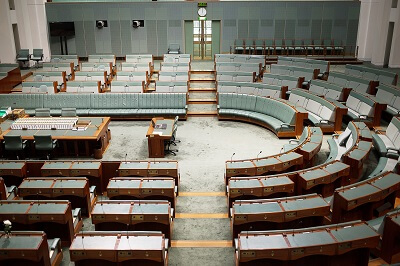
Introduction
The defence of privilege is concerned with information and documentation that is protected from defamation claims. The first instance of the defence of privilege was illustrated in common law as far back as 15851. In those days, the defence of privilege could be raised as a defence against statements made in the course of court proceedings and debates in parliament, but not for reports of parliamentary proceedings2. To remedy this, by 1840, the statutory defence of Absolute Privilege for reports of parliament was implemented.
Presently, while there are two broad types of privilege in Australian law – absolute and qualified – the Defamation Act 2005 (Qld)outlines all the defences relevantly protected by privilege, including the defences of Absolute Privilege, Publication of Public Documents, Fair Report of Proceedings, and Qualified Privilege. This article will focus specifically on the defence of Absolute Privilege as recognised both by the Defamation Act 2005 and at common law.
For further information on other defences related to privilege, please refer to our articles on “The Defences of Protected Reports” and “Qualified Privilege”.
The Statutory Defence
When established, the defence of Absolute Privilege will provide a complete defence to a claim for defamation3. Section 27 of the Defamation Act 2005 (‘the Defamation Act’) provides that there will be a complete defence against a defamation claim where the defendant can prove that the defamatory material was published during parliamentary or judicial proceedings, including proceedings in a tribunal. The Defamation Act further specifies the circumstances and materials in relation to which the defence can be relied upon, including but not limited to orders, judgements, debates, proceedings, evidence, other documents filed or lodged or otherwise published as part of the proceedings, and broadcasts4.
Parliamentary Proceedings
In parliamentary proceedings, publications of any documents or evidence brought before Parliament will be protected by the defence of Absolute Privilege, and accordingly, any claim for defamation with respect to such documents or evidence will inevitably fail. Section 27(2)(a) of the Defamation Act specifically covers the defence of Absolute Privilege with respect to parliamentary proceedings, with schedule 5 of the Defamation Act defining a parliamentary body to include parliament, legislature, house of a parliament or legislature, and committee of a parliament or legislature of any country.
Furthermore, section 3 of the Parliamentary Papers Act 1908 (Cth) expressly provides authority to government printers to publish parliamentary proceedings. No cause of action in defamation will succeed where parliamentary papers have been authorised to be published, including any evidence or documentation of proceedings5. All fair and accurate reports and broadcasts published about parliamentary proceedings will by law be protected by the defence of Absolute Privilege.
Judicial Proceedings
Judicial proceedings are protected by the defence of Absolute Privilege under section 27(2)(b) of the Defamation Act. Protected publications of proceedings include documents6, evidence7, and judgments or orders made as a decision of, or as part of, a judicial proceeding, including proceedings in front of a tribunal8. Schedule 5 of the Defamation Actdefines an Australian tribunal as follows:
‘… any tribunal (other than a court) established by or under a law of an Australian jurisdiction that has the power to take evidence from witnesses before it on oath or affirmation (including a Royal Commission or other special commission of inquiry).”
While common law states otherwise, the Royal Commission applies as a tribunal for the purposes of the Defamation Act in Australia. In the eyes of the law, members of the Royal Commission, such as a Royal Commissioner, would attract the same protection as the justice of the High Court of Australia (‘High Court’)9. Similarly, other members of the Royal Commission including legal practitioners10 and witnesses, would attract the same protection as a barrister appearing before the High Court11. Read more about the protection awarded to the Royal Commission below.
The defence of Absolute Privilege also extends to statements made in all courts, tribunals, disciplinary committees, and other bodies that practice judicial or quasi-judicial functions. This includes statements made in various stages of the proceedings, including the initiating process, in pleadings, in reasoning for decisions, or in other reports or related documents. The primary reason behind the defence of Absolute Privilege applying to judicial proceedings is the concept of an implied“…public policy that those engaged in the administration of justice should be at liberty to speak freely…” without fear of or having to be concerned with civil actions brought against them24.
It is relevant to note that the defence of Absolute Privilege will not protect statements published within tribunals that practice administratively and as private associations.
The Common Law Defence
At common law, Absolute Privilege includes reports, papers, and votes published or stated in the course of judicial and parliamentary proceedings12. This defence extends to what is published or stated, as well as the information that prompted the publication or statement13. Absolute Privilege extends to protecting participants involved in the proceedings, including members, parties, witnesses, and practitioners14.
Parliamentary Proceedings
The defence of Absolute Privilege protects a wide range of information and documents relating to parliamentary proceedings, includes notes made in preparation for providing a speech, petitions presented, witness statements, publications for typing, printing, and compilations of material15.
In order for parliamentary proceedings to be protected under the defence of Absolute Privilege at common law, it is a requirement that the proceedings were conducted as a result of inherent necessity16 and public policy17. In the case of Mann v O’Neill, the court held that proceedings arise from necessity, and as such, that it is important to allow participants to “be able to discharge their duties freely and without fear of civil action for anything said by them…”18. It follows that at common law, the application of full immunity from defamation claims ends where the necessity of it ceases19.
Additionally, the defence of Absolute Privilege protects parliamentary proceedings to the extent that the public interest favours the members of the proceedings20. In the case of Gibbons v Duffell21, the court held that the defendant was not protected by the defence of Absolute Privilege because the reports containing defamatory imputations were not made in the interest of the public.
The general exception to the public interest rule is where the defamatory statements of or about the parliamentary proceedings are made outside of the proceedings22. Under such circumstances, defamatory statements would not be protected by Absolute Privilege23.
Statements Preceding or Incidental to Proceedings
With respect to statements preceding or incidental to a proceeding, there are three main categories for when the defence of Absolute Privilege may be applied by the court25:
- Steps taken to bring the action into existence;
- Steps taken after initiation of proceedings; and
- Matters forming part of the court process.
Absolute Privilege may also apply where statements are made during an investigation of a complaint or in the process of reporting results of an investigation26. Relevantly, investigating bodies themselves are only generally protected by the defence of qualified privilege, and not the defence of absolute privilege27.
For more information on the defence of qualified privilege, please refer to our article on “The Defence of Qualified Privilege”. For more information on public policy or public interest in relation to defamation matter, please refer to our article on “Public Policy in Defamation Claims”.
Protected Tribunals
To determine whether a tribunal practices judicially, a detailed analysis of the constitution and functions of the tribunal is required, including the specific procedures conducted by the tribunal in question28. Whether Absolute Privilege will protect statements made in the course of the tribunal proceedings will depend on the following:
- Whether the tribunal has been ‘recognised by law’29;
- Whether proceedings are for making a decision between parties or for status or rights of a person30;
- Whether results of proceedings are final or have been determined to another body31; and
- Whether the proceedings determined truth and justice (a matter of public concern)32.
Recognised by Law
The phrase ‘recognised by law’ refers to circumstances in common law where the courts have determined that a specific tribunal will be protected by the defence of Absolute Privilege. Tribunals that have been recognised by common law include military courts33, tribunals for investigative complaints made against legal practitioners34, and commissioners of state for inquisitions into dismissals of school headmasters35. Additionally, in the case of Trapp v Mackie36, the court held that a tribunal will be protected by the defence of Absolute Privilege where it has equivalent or comparable attributes and mannerisms to a court of justice. In contrast, the defence of Absolute Privilege does not protect tribunals that hold a less judicial function, including inquiries conducted by the Queensland Turf Club37, meetings between local councils for the purposes of granting music and dancing licences38, inquiries into commissioners with appointed administrative functions39, commissions regulated by statute, and inquiries into complaints about surgeons by captains of merchant vessel40. While tribunals are generally required to act within the rules of natural justice, there is a high standard applied in determining whether a tribunal acts judicially to an extent that is comparable to a court of justice41.
Decision-Making between Parties or Determining Statuses and Rights
A criterion for determining whether proceedings conducted in a tribunal resemble proceedings conducted in a judicial court is whether the purpose of the proceedings is to make decisions in a dispute or matter between two or more parties, or to determine the status or rights of an individual42. With some exceptions, a tribunal that exists for the purposes of making decisions between parties or to determine the rights of a particular individual will generally be protected by the defence of Absolute Privilege with respect to matters addressed during the course of proceedings conducted in that tribunal. In the case of Australian Postal Commission v Dao (No 2)43, the court found that the anti-discrimination tribunal resembled judicial proceedings as the tribunal relevantly made decisions between parties, asserted rights, and awarded remedies in relation to the Suitors Fund Act 1951.
This is not always the case, however. Simply establishing that a tribunal makes some determinations with respect to the rights or status of an individual, or a finding that a tribunal does not merely carry an administrative function is not sufficient evidence to establish that a tribunal is considered to carry a judicial function44. A tribunal will commonly not be protected where it mainly addresses the granting of licences or general inquiries made46. In the case O’Connor v Waldron47, the court held that the tribunal was not protected by the defence of Absolute Privilege as it did not carry out functions resembling that of a court by reason that the Commissioner under the Canadian Combines Investigation Act did not determine rights of an individual or decide whether they were innocent or guilty.
Conversely, in England, disciplinary inquiries by Benchers of the Inns of Court are considered to be protected by the defence of Absolute Privilege even though these functions are not warranted by statute and the Inns of Court does not conduct proceedings as a court of justice generally would45.
Final Proceedings or Referred to Another
In circumstances where a tribunal makes a final decision and does not simply report to another body, the tribunal will be considered judicial and will be protected under the defence of Absolute Privilege. Conversely, where the tribunal passes the matter down to another body to deal with, the tribunal would not generally be considered judicial for the purposes of the defence of Absolute Privilege. The exception is where the report or finding of the tribunal has a major influence on the ultimate decision, as identified in the case of Trapp v Mackie48.
Royal Commissions
Under legislation, the Royal Commission is protected by Absolute Privilege. However, at common law, it is not. In the case of Douglass v Lewis49, Justice Mitchell found that a Royal Commission was not protected by Absolute Privilege as it did not satisfy the two requirements for attracting the defence in that proceedings conducted by the Royal Commission were not conducted for the purposes of determining the outcome of a dispute between two parties, and the decisions made would not affect the rights or obligations of any individual.
Protected Holders of Office
Usually, statements made by someone holding a high office during the course of their duty will be protected under the defence of Absolute Privilege50. Examples of protected holders of office include military officers and selected foreign officials of other countries51.
Relevantly, while some officers may not be protected by the defence of Absolute Privilege, these officers may otherwise be protected under public interest immunity52. Conversely, even where certain holders of office would generally be protected under the defence, the defence may not always apply depending on the circumstances.
In the case of Gibbons v Duffell53, the defendant was a police inspector, and the plaintiff was his subordinate. The court held that while the defence of Absolute Privilege would normally arise on the grounds of reports being made between police officers as protected holders of office, the reports made in this particular case were not privileged as they were made outside of the scope of protected reports of proceedings.
Contact Harris Defamation Lawyers
Whilst the defence of Absolute Privilege may appear relatively clear cut at first glance, it can often be challenging to determine whether or not the defence is likely to apply to a particular circumstance. Some defamatory imputations made in a particular situation or proceeding may give rise to a defence of Absolute Privilege, while others may not. Accordingly, the courts will determine the application of the defence on a case-by-case basis. If you have been accused of publishing a defamatory comment and believe you may have a defence of absolute privilege, contact Harris Defamation Lawyers today for a fixed-fee consultation to discuss your legal rights and options.






